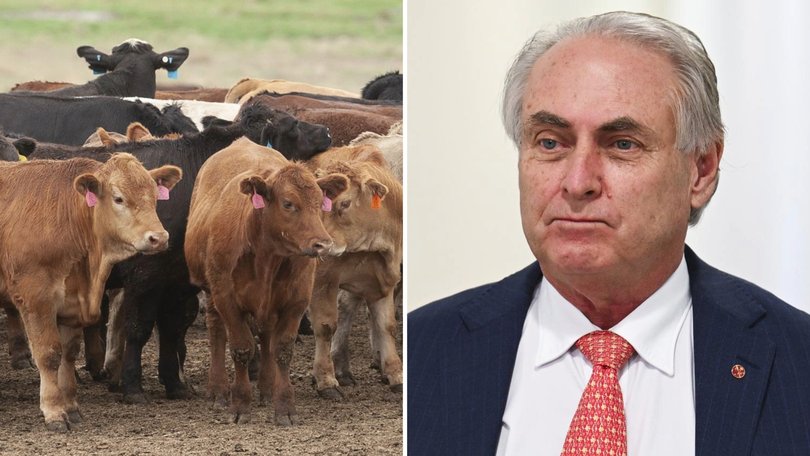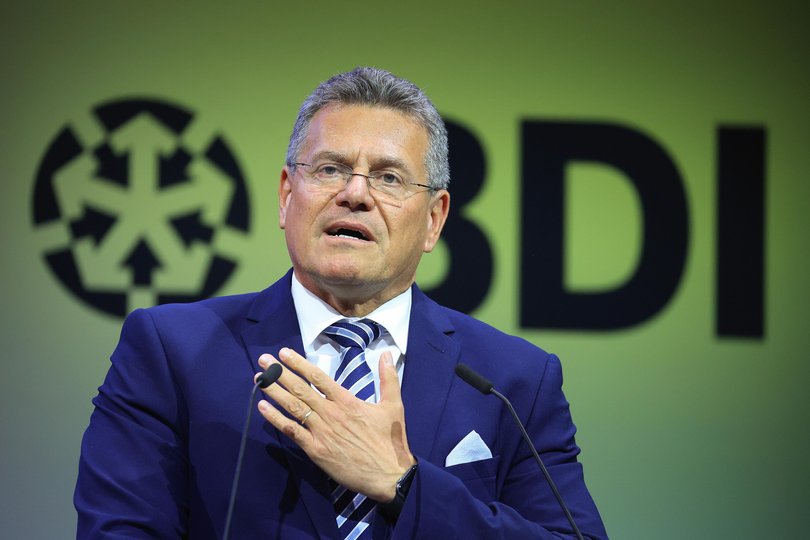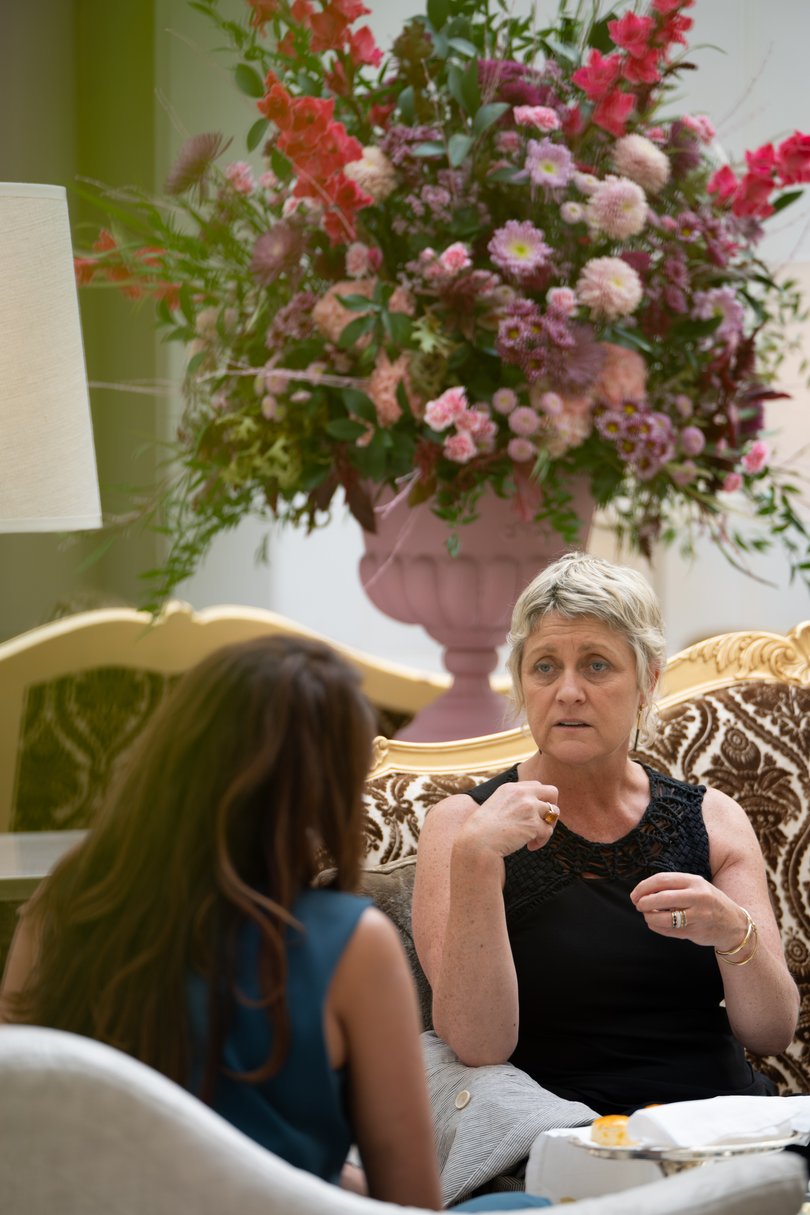‘We can get a deal’: Hopes for a trade deal high as EU boss flies in for talks with Don Farrell
The European Union’s top trade negotiator has arrived in Australia to reopen trade talks, with both sides sounding optimistic about securing a long elusive deal.

The European Union’s top trade negotiator has arrived in Australia to reopen trade talks, with both sides sounding optimistic about securing a long elusive deal.
Maroš Šefčovič, the EU’s Trade Commissioner, will meet Trade Minister Don Farrell in Melbourne on Wednesday to thrash out a possible breakthrough in the deadlock that saw talks collapse in 2023.
Senator Farrell is hosting a meeting assembling his counterparts from the 12 countries that are part of the giant trading bloc known as the Comprehensive and Progressive Agreement for Trans-Pacific Partnership or CPTPP.
Sign up to The Nightly's newsletters.
Get the first look at the digital newspaper, curated daily stories and breaking headlines delivered to your inbox.
By continuing you agree to our Terms and Privacy Policy.The EU has expressed interest in cooperating with the grouping of Pacific Rim countries that include Australia, Brunei Darussalam, Canada, Chile, Japan, Malaysia, Mexico, New Zealand, Peru, Singapore, the United Kingdom and Vietnam.
Senator Farrell and Commissioner Šefčovič will talk on the sidelines of the CPTPP trade ministers’ meeting.
We have a window of opportunity. We must seize it now, before it is too late.
Mr Farrell told The Nightly ahead of the meeting: “I’m very positive and think that with Trade Commissioner Šefčovič we can get a deal.”
The mood in Brussels was equally optimistic.
One high-level EU official told The Nightly: “There is new momentum for our push for free trade agreements.”
“Geopolitical changes are so important today and very uncontrollable sometimes, so it’s very important for this momentum to be maintained.
“In recent years, we have seen an enormous demand from partners to try and accelerate negotiations, and there is good political momentum with many partners to try and push that negotiation.
“In particular, the geopolitical and geoeconomic contexts certainly help.
“And in a world where rules-based order is also put into question, also on the trade area, it’s very important to have a secure framework for our businesses to operate and access to markets both ways.”
The official said trade had surged where the bloc had signed deals.

Signalling a change of heart from the notoriously protectionist bloc, the EU’s Commissioner for Economy and Productivity, Valdis Dombrovskis, said that diversifying trade relations would accelerate economic growth.
“Overall, we can no longer afford to be content with just getting by,” he said.
“We have a window of opportunity. We must seize it now, before it is too late.”
A potentially lucrative deal with the EU has eluded both Labor and the Coalition.
The Opposition’s trade spokesman Kevin Hogan said that the Coalition welcomed the negotiations being reopened, but he said Labor must not sell out farmers.
Australia walked away from talks last time over a dispute relating to several thousand tonnes of beef that the EU were refusing to allow into the single market.
“For beef, we want a substantial increase from the original 24,000-tonne proposal to somewhere around the 40,000-tonne mark, alongside meaningful improvements for sheep meat, sugar and dairy access without being tied to conditionality,” Mr Hogan said.
“Our test is straightforward: any agreement must deliver real new opportunities for Australian farmers and exporters, protect our right to use common food names, and avoid imposing unfair new barriers under the guise of sustainability or environmental regulation.
“We see an FTA with the EU as a top priority, opening a market of around 446 million consumers and a nominal GDP of about US$16.6 trillion to more Australian goods and services.
“However, we will not support an agreement with the EU unless it is clearly a positive deal for Australia.”
Both Australia and the EU decided to revisit trade talks following US President Donald Trump’s “Liberation Day” tariffs that were announced during the Australian election campaign.
But internal barriers to doing more trade when it comes to agricultural and meat options continue to be a hurdle for negotiators to overcome.
France, which is especially powerful in Europe, and Ireland are particularly opposed because they fear it would allow Australian beef imports to the EU to increase, jeopardising their own producers.
For example, the French are opposed to a deal the EU struck after three decades of negotiations with Latin American countries.
The commission, which executes trade powers for the bloc’s entire 27 member states, is trying to secure agreement from national governments to ratify the deal so it can come into force.
But in Spain, which has commercial infrastructure and renewable energy ties with Australia, the mood is one of complete optimism when it comes to sealing a deal, according to Madrid-based Australian businesswoman Gina Bowman, who sits on the boards of the Spain for Australia Business in Europe Network and Australia, New Zealand, Spain Business Association.
“Since the negotiations stalled in 2023, the world has become a lot more volatile politically, and therefore in the trade space, and that’s already on the back of the legacy of supply chain issues from the pandemic,” Ms Bowman said.
“Doing business across borders now is more complex, and an agreement would underpin that bilateral business and open up opportunities in most sectors.
“If the agreement is signed within the coming months, there are estimates that the FTA could boost Australia’s GDP by up to $7.4 billion.”

Prime Minister Anthony Albanese pressed Australia’s case for an EU trade deal with French President Emmanuel Macron during their bilateral meeting in New York on the sidelines of the United Nations General Assembly meeting in September.
But President Macron is severely weakened domestically and is trying to stave off a growth in support for populists on his right and left and it is unclear if he will have any political capital to spend on Australia, at the same time he is facing pressure on signing off on the trade deal with the South American countries.

